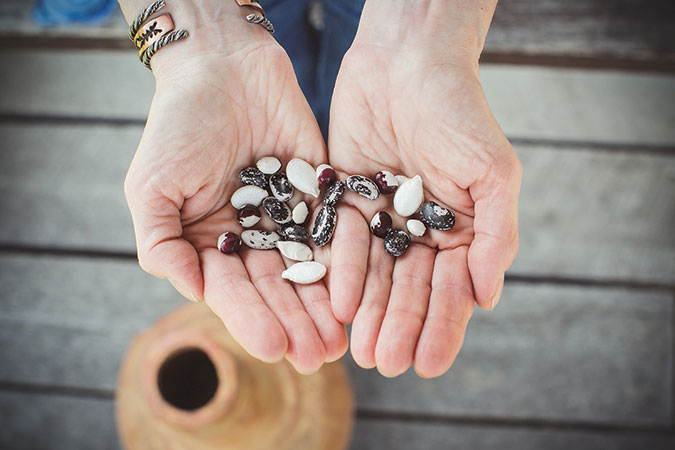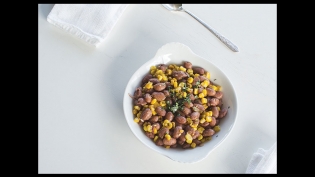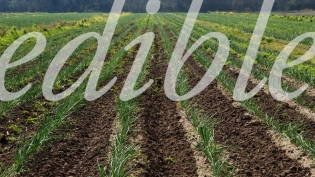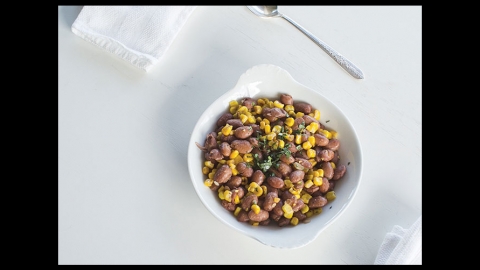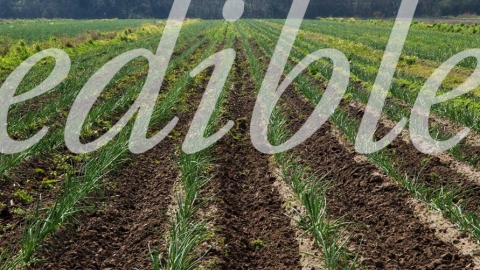Seeds of Renewal
Intrigued, Fred Wiseman bit into one of the ground-cherries he had just purchased at a farm stand in Hardwick. Suddenly, his taste buds sparked memories of his grandmother’s cooking. “She made ground-cherry sauce and served it over fish,” he explains. “I was a kid and I didn’t like it. There were too many seeds.” This kind of recollection, along with many other anecdotes from Abenaki people in this bioregion, has shaped the tribe’s struggle for recognition and their subsequent revival of indigenous agricultural and ceremonial practices.
Professor Wiseman is an ethnobotanist, native rights advocate and Abenaki tribe member. In 2012, he launched the “Seeds of Renewal” project to encompass the full spectrum of food—from seed saving and growing to the development of a cookbook and cooking with indigenous cuisine. He has been working tirelessly to track down and reintroduce original crops and cultivation methods to Abenaki gardeners and farmers.
For indigenous people, “Identity is a negotiation between who I say I am and who society says I am,” Wiseman muses. This project not only returns traditional seeds and foods to native people, but it also helps others see the Abenaki for who they are.
The Seeds of Renewal project took root soon after the Abenaki tribe gained Vermont state recognition. After interviewing many Abenaki to support the case for recognition, Professor Wiseman began to notice similarities in people’s stories. He realized that many local indigenous people connect their tribal identity to agriculture.
Through a career of ethnobotanical research with the Hopi people in Arizona and the Mayo and Yaqui peoples in Northwestern Mexico, Wiseman gained a profound appreciation for these groups’ self-identification. “Agriculture is the engine of identity for these tribes. They see themselves as the keepers of the land, crops and spirituality that connect them.” When he returned to northern Vermont to care for his mother, he began to question how his own ancestors saw themselves.
Wiseman had previously misunderstood traditional Abenaki agriculture as employing a basic “slash and burn” technique. Because records and firsthand accounts were missing, he started talking with indigenous elders. They recounted stories of a different kind of farming: one that was complex, connected to seasonal ritual and reflective of people who identify agriculturally. He listened and realized that these stories reflected indigenous farming practices recorded by French explorer Samuel de Champlain in the early 17th century.
Nancy Doucet, an Abenaki Koasek Chief, told Wiseman that “Our ancestors had their own corn. We gave it to the settlers in the 1790s.” She told him about a Vermont farming family that had kept the seed pure and recently returned it to the Abenaki. He was astounded. Not only were his people agriculturally sophisticated, but they still had access to their seeds. The seed chase began.
Crops such as the rare and endangered Gaspé and Abenaki Rose corn, skunk beans and Algonquin squash have a long history of being grown by indigenous people of the region but are becoming rare. Thanks to Professor Wiseman’s research and Peggy Fullerton’s propagation at the Koasek Farm near Newbury, Vermont, these traditional seeds are being grown with the traditional mound system.
Peggy explains that “The Koasek garden, named Sagakwa, is 40 feet by 200 feet. Down the road, we have a separate plot to grow vegetables that cross-pollinate. In case a crop fails in one location, seed is grown in tribe members’ personal gardens. Our original Koasek of the Koas corn has been growing here since 2006. We have plans to expand in 2016 to produce even more food for members of the tribe, elders in our villages, local senior centers and any canning and preserving needs.”
This is food sovereignty in action, which respects the right for all people to define their own food systems from the ground up. Food sovereignty is rooted in an international peasant movement focused on people re-gaining and maintaining access to their land, eating the food they produce and honoring all participants of every food system equally.
“It is essential to educate others about the traditional seeds and honor the native people who have grown and saved them,” Cheryl O’Neil explains. She is a gardener at the Intervale’s Heritage Gardens and an Abenaki tribe member. Her background in health care inspires her to educate others about the importance of eating local food that’s grown and prepared in a wholesome way.
Cheryl believes that “We are all the Creator’s people. We need to get others on board with eating simple, wholesome food.” First, they must grow out the seeds for multiple years in order to have enough stock. Thanks to the efforts of the Seeds of Renewal project, this dream to taste her own native corn and share it with others is becoming a reality.
Through the project’s continued efforts, Abenaki can maintain their indigenous agricultural, spiritual and culinary traditions. Funding and additional research are required to confirm the genetics and nutritional value of these indigenous crops. Meanwhile, Professor Wiseman and his cohorts continue their work. These recipes provide a taste of an extensive compendium that has been revived through the project.
Related Stories & Recipes
Chief Nancy Doucet’s Summer Soup
A specialty of the late Koasek of the Koas chief Nancy Doucet


